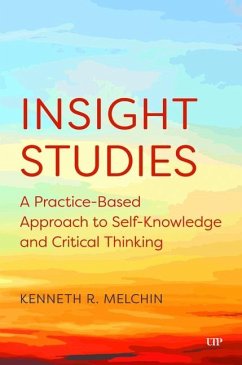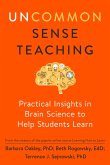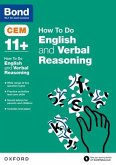- Gebundenes Buch
- Merkliste
- Auf die Merkliste
- Bewerten Bewerten
- Teilen
- Produkt teilen
- Produkterinnerung
- Produkterinnerung
Insight Studies draws on Bernard Lonerganâ s philosophy to teach critical thinking skills through a practice-based method inspired by how we learn musical instruments.
Andere Kunden interessierten sich auch für
![Practising Insight Mediation Practising Insight Mediation]() Cheryl A. PicardPractising Insight Mediation60,99 €
Cheryl A. PicardPractising Insight Mediation60,99 €![A Second Collection A Second Collection]() Bernard LonerganA Second Collection90,99 €
Bernard LonerganA Second Collection90,99 €![A Third Collection A Third Collection]() Bernard LonerganA Third Collection41,99 €
Bernard LonerganA Third Collection41,99 €![The Human Paradox The Human Paradox]() Ralph HeintzmanThe Human Paradox128,99 €
Ralph HeintzmanThe Human Paradox128,99 €![Uncommon Sense Teaching Uncommon Sense Teaching]() Barbara Oakley (Barbara Oakley)Uncommon Sense Teaching12,99 €
Barbara Oakley (Barbara Oakley)Uncommon Sense Teaching12,99 €![On Agamben, Donatism, Pelagianism, and the Missing Links On Agamben, Donatism, Pelagianism, and the Missing Links]() Dr Peter Iver Kaufman (USA University of North Carolina)On Agamben, Donatism, Pelagianism, and the Missing Links69,99 €
Dr Peter Iver Kaufman (USA University of North Carolina)On Agamben, Donatism, Pelagianism, and the Missing Links69,99 €![CEM How To Do: Bond 11+ English and Verbal Reasoning (for Cambridge Select Insight) CEM How To Do: Bond 11+ English and Verbal Reasoning (for Cambridge Select Insight)]() Michellejoy HughesCEM How To Do: Bond 11+ English and Verbal Reasoning (for Cambridge Select Insight)19,99 €
Michellejoy HughesCEM How To Do: Bond 11+ English and Verbal Reasoning (for Cambridge Select Insight)19,99 €-
-
-
Insight Studies draws on Bernard Lonerganâ s philosophy to teach critical thinking skills through a practice-based method inspired by how we learn musical instruments.
Produktdetails
- Produktdetails
- Verlag: University of Toronto Press
- Seitenzahl: 128
- Erscheinungstermin: 22. August 2025
- Englisch
- Abmessung: 231mm x 152mm x 18mm
- Gewicht: 396g
- ISBN-13: 9781487566104
- ISBN-10: 1487566107
- Artikelnr.: 73288584
- Herstellerkennzeichnung
- Libri GmbH
- Europaallee 1
- 36244 Bad Hersfeld
- gpsr@libri.de
- Verlag: University of Toronto Press
- Seitenzahl: 128
- Erscheinungstermin: 22. August 2025
- Englisch
- Abmessung: 231mm x 152mm x 18mm
- Gewicht: 396g
- ISBN-13: 9781487566104
- ISBN-10: 1487566107
- Artikelnr.: 73288584
- Herstellerkennzeichnung
- Libri GmbH
- Europaallee 1
- 36244 Bad Hersfeld
- gpsr@libri.de
Kenneth R. Melchin is a professor emeritus in Theology and director of the Lonergan Centre at Saint Paul University.
Preface
1. Introduction to Insight Studies
Insight Studies: What Kind of Organism Am I?
Self-Knowledge, Relationships, and Democracies
Self-Knowledge and Critical Thinking
A Practice-Based Approach
Outline of the Chapters and Learning Modules
2. Getting Started: Practice Modules 1–3
Selecting Puzzles that are Right for You
Module 1: Establishing a Daily Routine of Puzzle Solving
Module 2: A Special Procedure for Puzzle Solving
Excursus: Introducing Self-Knowing
Module 3: Focusing on Your Mind’s Operations
Applying the Skills
3. Identifying the Operations: Practice Modules 4–6
Module 4: Differentiating Groups of Operations
Excursus: Some Observations on the Skill Development Process
Excursus: Introducing the Theory of Knowing
Module 5: Identifying the Operation of Direct Insight
Module 6: Identifying the Operation of Judgment
Applying the Skills
4. Feelings, Values, and Decisions: Practice Modules 7–9
Module 7: Identifying Feelings and Values
Excursus: Revisiting the Theory of Knowing
Module 8: Feelings, Values, and Decisions
Module 9: Observing an Inner Normativity
Applying the Skills
5. Applications
Ethics and Discernment
Conflict and Insight
Sociology and Everyday Arguments
Psychology and Problem Solving
Philosophy and Self-Possession
Politics and Spirituality
Concluding Reflections
6. Afterword
Appendix
Notes
Bibliography
Index
1. Introduction to Insight Studies
Insight Studies: What Kind of Organism Am I?
Self-Knowledge, Relationships, and Democracies
Self-Knowledge and Critical Thinking
A Practice-Based Approach
Outline of the Chapters and Learning Modules
2. Getting Started: Practice Modules 1–3
Selecting Puzzles that are Right for You
Module 1: Establishing a Daily Routine of Puzzle Solving
Module 2: A Special Procedure for Puzzle Solving
Excursus: Introducing Self-Knowing
Module 3: Focusing on Your Mind’s Operations
Applying the Skills
3. Identifying the Operations: Practice Modules 4–6
Module 4: Differentiating Groups of Operations
Excursus: Some Observations on the Skill Development Process
Excursus: Introducing the Theory of Knowing
Module 5: Identifying the Operation of Direct Insight
Module 6: Identifying the Operation of Judgment
Applying the Skills
4. Feelings, Values, and Decisions: Practice Modules 7–9
Module 7: Identifying Feelings and Values
Excursus: Revisiting the Theory of Knowing
Module 8: Feelings, Values, and Decisions
Module 9: Observing an Inner Normativity
Applying the Skills
5. Applications
Ethics and Discernment
Conflict and Insight
Sociology and Everyday Arguments
Psychology and Problem Solving
Philosophy and Self-Possession
Politics and Spirituality
Concluding Reflections
6. Afterword
Appendix
Notes
Bibliography
Index
Preface
1. Introduction to Insight Studies
Insight Studies: What Kind of Organism Am I?
Self-Knowledge, Relationships, and Democracies
Self-Knowledge and Critical Thinking
A Practice-Based Approach
Outline of the Chapters and Learning Modules
2. Getting Started: Practice Modules 1–3
Selecting Puzzles that are Right for You
Module 1: Establishing a Daily Routine of Puzzle Solving
Module 2: A Special Procedure for Puzzle Solving
Excursus: Introducing Self-Knowing
Module 3: Focusing on Your Mind’s Operations
Applying the Skills
3. Identifying the Operations: Practice Modules 4–6
Module 4: Differentiating Groups of Operations
Excursus: Some Observations on the Skill Development Process
Excursus: Introducing the Theory of Knowing
Module 5: Identifying the Operation of Direct Insight
Module 6: Identifying the Operation of Judgment
Applying the Skills
4. Feelings, Values, and Decisions: Practice Modules 7–9
Module 7: Identifying Feelings and Values
Excursus: Revisiting the Theory of Knowing
Module 8: Feelings, Values, and Decisions
Module 9: Observing an Inner Normativity
Applying the Skills
5. Applications
Ethics and Discernment
Conflict and Insight
Sociology and Everyday Arguments
Psychology and Problem Solving
Philosophy and Self-Possession
Politics and Spirituality
Concluding Reflections
6. Afterword
Appendix
Notes
Bibliography
Index
1. Introduction to Insight Studies
Insight Studies: What Kind of Organism Am I?
Self-Knowledge, Relationships, and Democracies
Self-Knowledge and Critical Thinking
A Practice-Based Approach
Outline of the Chapters and Learning Modules
2. Getting Started: Practice Modules 1–3
Selecting Puzzles that are Right for You
Module 1: Establishing a Daily Routine of Puzzle Solving
Module 2: A Special Procedure for Puzzle Solving
Excursus: Introducing Self-Knowing
Module 3: Focusing on Your Mind’s Operations
Applying the Skills
3. Identifying the Operations: Practice Modules 4–6
Module 4: Differentiating Groups of Operations
Excursus: Some Observations on the Skill Development Process
Excursus: Introducing the Theory of Knowing
Module 5: Identifying the Operation of Direct Insight
Module 6: Identifying the Operation of Judgment
Applying the Skills
4. Feelings, Values, and Decisions: Practice Modules 7–9
Module 7: Identifying Feelings and Values
Excursus: Revisiting the Theory of Knowing
Module 8: Feelings, Values, and Decisions
Module 9: Observing an Inner Normativity
Applying the Skills
5. Applications
Ethics and Discernment
Conflict and Insight
Sociology and Everyday Arguments
Psychology and Problem Solving
Philosophy and Self-Possession
Politics and Spirituality
Concluding Reflections
6. Afterword
Appendix
Notes
Bibliography
Index








